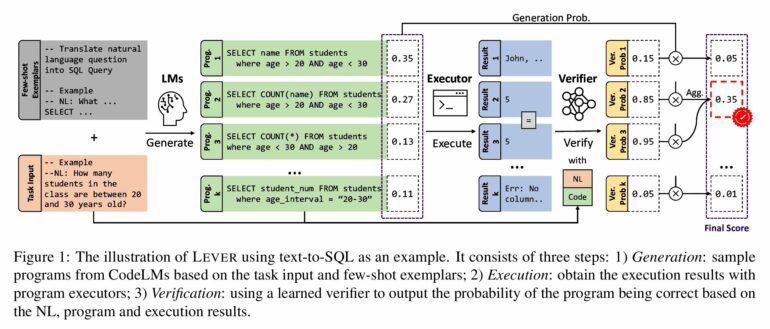TL;DR:
- Large language models (LLMs) have revolutionized AI and can handle various tasks.
- Code LLMs show promise but need optimization for accuracy.
- LEVER combines natural language description, program form, and execution results to verify code generated by LLMs.
- LEVER improves precision and correctness, outperforming base code LLMs across domains.
- LEVER’s innovative approach has significant implications for the AI market.
Main AI News:
In the ever-evolving landscape of Artificial Intelligence, large language models (LLMs) have emerged as true game-changers. These powerful models have transformed the way we interact with AI, enabling them to handle a wide array of tasks with remarkable proficiency. From simulating human-like responses to generating content, summarizing text, and facilitating language translation, LLMs have become veritable multi-tasking wizards. Among their many applications, the ability to translate natural language descriptions into executable code stands out as a crucial capability, forming the backbone of virtual assistants, robotics control systems, and database interfaces.
Code LLMs, which are models pre-trained on code, have already shown impressive performance in in-context few-shot learning scenarios. However, to fully leverage their potential, enhancing their accuracy and optimizing their performance has become a priority, albeit a computationally demanding one.
Although LLMs may face challenges in accuracy when dealing with few shots, their results improve significantly when provided with an ample number of samples. The key lies in drawing samples at scale, employing majority voting, and filtering results based on test cases. Crucially, data types, value ranges, and variable properties play vital roles in gauging program correctness, acting as rich semantic cues for model solutions.
Enter LEVER – Learning to Verify, a groundbreaking approach for language-to-code generation utilizing code LLMs. LEVER capitalizes on a sophisticated amalgamation of the natural language description, program surface form, and execution outcome to train the verifier in discerning and rejecting flawed programs. By combining verification probability with LLM generation probability, an aggregate probability is crafted, allowing for the marginalization of programs with identical execution results. This process ultimately identifies the programs with the highest likelihood of producing the correct outcome, serving as the output based on a reranking score determined by this probability.
LEVER represents a pivotal step forward in language-to-code generation, embedding a learning-to-verify mechanism to assess the accuracy of programs generated by LLMs. By subjecting the creations to scrutiny, LEVER aims to elevate the precision and correctness of the output significantly. In rigorous evaluations, LEVER has been put through its paces across four diverse datasets representing distinct domains – table QA, math QA, and fundamental Python programming. The results have been astounding, with performance benefits using code-davinci-002 ranging from 4.6% to 10.9%, consistently outperforming the base code LLMs. Across all datasets, LEVER has indisputably achieved state-of-the-art results, exemplifying its unparalleled ability to produce precise and contextually relevant code from natural language descriptions.
Conclusion:
LEVER’s approach to language-to-code generation through learning to verify marks a significant advancement in the AI market. By enhancing the precision and correctness of code LLMs, LEVER opens new possibilities for virtual assistants, robotics control, database interfaces, and other AI applications that depend on the accurate translation of natural language into executable code. This improvement in performance can drive the adoption of AI in various industries and propel the market towards more sophisticated and contextually relevant AI solutions. As businesses seek to leverage AI capabilities for efficiency and innovation, LEVER’s superiority in producing accurate code from natural language descriptions positions it as a key player in the market.

